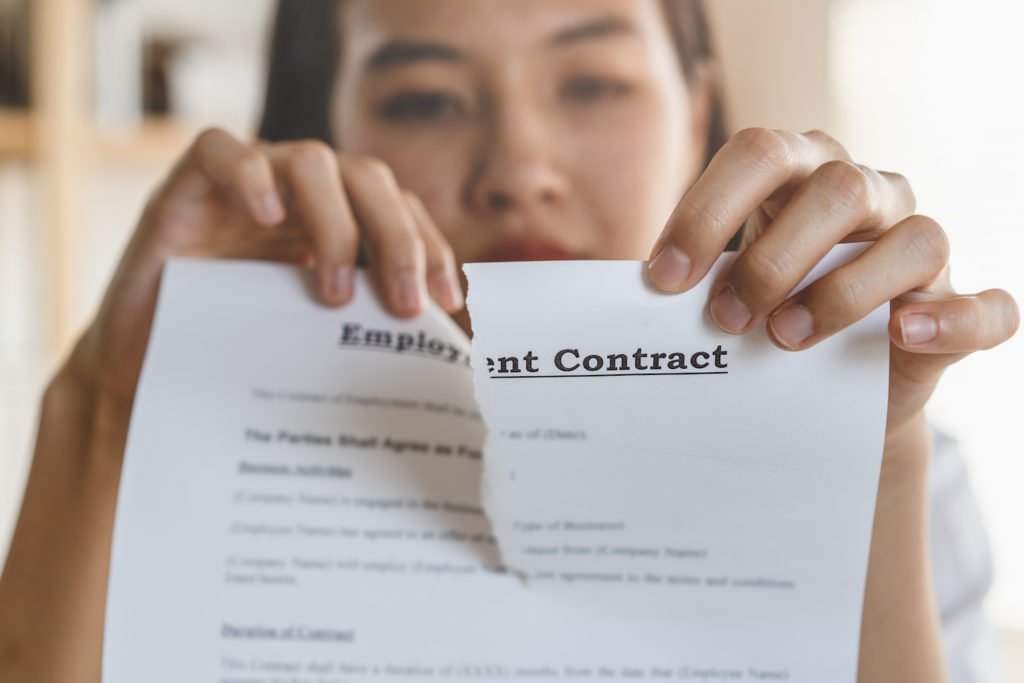Nevada is an “employment-at-will” state, which means that employers generally can fire their workers for any reason. But there are some exceptions to employment-at-will. Nevada employers commit wrongful termination when they fire an employee because:
- The employer is discriminating against the employee on the basis of race, nationality, sex, religion, age, disability, gender identity/expression, or sexual orientation;
- The firing is a breach of contract; or
- The firing is a retaliation against the employee’s legally protected actions (such as refusing to work in unsafe conditions)
Nevada’s wrongful termination laws typically apply to employers with 15 or more workers, depending on the case.1 Wrongfully fired employees may be able to sue for:
- Back pay
- Pain and suffering
- Punitive damages
- Reinstatement
- Attorney’s fees and court costs
In this article, our Las Vegas labor law attorneys discuss:
- 1. What is the definition of wrongful termination?
- 2. What are the bases of wrongful termination claims?
- 3. What are the damages?

Illegally fired employees may bring a wrongful termination lawsuit against the employer.
1. What is the definition of wrongful termination in Nevada?
Wrongful termination is when an employer fires an employee for an unlawful reason. In general, Nevada is an “at-will” employment state.2 This means that employers may fire employees for any reason and at any time. But there are three main exceptions:
- the firing breaks a contract between the employer and employee;
- the firing is based on the employee’s sex, race, national origin, religion, age, or disability (discriminatory reasons); or
- the firing is in retaliation to the employer taking certain protected actions (such as going to jury duty)3
These exceptions are discussed fully in section 2 below. Examples of lawful reasons to fire an employee include:
- the employee was constantly late
- the employee was rude
- the employee was incompetent
- the employee committed a crime
Note that employers are also allowed to fire employees for seemingly frivolous reasons, such as an annoying laugh or political affiliation. Just because the reason for a firing may be unjust does not automatically mean it is illegal.
2. What are the bases for wrongful termination claims in Nevada?
The three main categories of wrongful termination cases are:
- The employee is part of a protected class, and the employee fired him/her because of it;
- The employer and employee had a contract, and the firing breached the contract’s terms; or
- The employee made a protected action (such as whistleblowing), and the employer fired him/her in retaliation
Note that these laws do not apply to all employers. In Nevada, wrongful termination laws generally apply only to companies with 15 or more employees.4 Aggrieved workers should consult with a Nevada labor law attorney to determine whether they have a claim.
2.1. Discrimination
Employers under state law are not permitted to fire employees if the reason has to do with their:
- race or color
- nationality
- religion
- age
- disability
- sex (including pregnancy)
- gender identity or expression
- sexual orientation5
In many cases, employers manufacture bogus reasons for firing someone (pretexts) when the real reason is that they are prejudiced. Therefore, employees are advised to keep all their records and to document everything related to their case. The more evidence they have that discrimination played a role, the better chance that an employment attorney can prove that the employee was terminated unlawfully.
2.2. Breach of contract
Sometimes bosses and their workers sign employment contracts that spell out the terms of the employment and imposes a duty of “good faith and fair dealing” on both parties to the contract.6 Depending on the case, these contracts can be written or oral. Some contracts are very specific, and others are very broad like collective bargaining agreements through a union.
If the employer fires the employee in a way that breaches the contract terms, then the employee may have a legal claim against the employer.
Example: Rex was hired by a television station as a reporter. Rex signed a five-year contract that explicitly listed all the reasons the station could fire Rex earlier “for cause.” But after two years, the firm fired Rex even though he committed no fireable offense. Rex may have a cause of action against the station for breaching the contract by firing him earlier than the five years.
Note that many workplaces have employee handbooks that explain the terms of employment, disciplinary procedures, probation periods, and firings. These handbooks often may serve as a basis for a wrongful firing case if the employer violated its terms.
2.3. Retaliation
Employers are usually permitted to fire employees who act in a way that harms the employer’s best interests. But employers are not allowed to fire employees in retaliation for them taking any of the following “protected” actions, even if these actions do cause the employer to suffer harm.7
- Jury duty
- Whistleblowing
- Filing an employment discrimination claim
- Filing a workers’ compensation claim
- Taking advantage of the FMLA
- Refusing to work in unsafe conditions
- Refusing to engage in illegal conduct
- Taking concerted action to improve wages and working conditions (such as through a union)
- Cooperating with an investigation about employment discrimination, hours, or wages
- Using guns, drinking alcohol, or using other legal products while off duty
See our related article, Is Nevada a Right to Work state?
2.3.1. Jury duty
Nevada employers generally may not fire employees for going to jury duty. If they do, the employee may sue the employer for:
- double lost wages and benefits,
- job reinstatement,
- attorney’s fees, and
- punitive damages
Note that going to jury duty does not deduct from the employee’s vacation time or sick leave.8
2.3.2. Whistleblowing
Nevada employers generally may not fire employees for reporting illegal conduct to an outside agency. Examples of whistleblowing include:
- A nurse reporting medical malpractice to the State Medical Board
- A food service worker reporting unsanitary conditions to the FDA
- A bank teller reporting fraud to the SEC
- A builder reporting unsafe conditions to OSHA (the Occupational Safe and Health Administration)
Nevada OSHA can help fired whistleblowers pursue remedies such as reinstatement and back pay.9

It is illegal to fire someone due to his/her race.
2.3.3. Employment discrimination
In general, it is wrongful discharge under both federal law and Nevada law for employers to fire workers for filing an employment discrimination claim with the government agency:
- Nevada Equal Rights Commission (NERC), or
- Equal Employment Opportunity Commission (EEOC)
If the case does not resolve through the claim process, then the employee may file a civil lawsuit for compensatory damages and punitive damages and possibly job reinstatement.10
2.3.4. Workers’ compensation
In general, it is against federal and Nevada law for employers to fire workers for filing a workers’ compensation claim. As with any legal matter, employees are encouraged to hire an attorney to help them compose the documentation in a way that proves the claim is in good faith.11
See our related article, Can a Company Retaliate Against a Worker for Filing a Workers Compensation Claim in Nevada?
2.3.5. FMLA
In general, employers with 50 or more workers must abide by the Family Medical Leave Act (FMLA). Therefore, employers may not fire employees who use FMLA to take off work for such reasons as:
- maternity leave,
- illness,
- caring for a sick family member, and/or
- addressing emergencies arising out of a relative’s military service
With some exceptions, employees are entitled to 12 weeks of FMLA leave a year. Note that employers are not obligated to pay workers while on FMLA leave.12
2.3.6. Unsafe conditions
In general, employers may not fire workers who refuse to work in conditions that are unreasonably unsafe for them.13
Example: Jack is a truck driver for a large Nevada company. Jack notices that his truck is smoking under the hood and that the wheels are not aligned. He tells his boss, who refuses to spend the money to service the truck. If Jack refuses to work, it would probably be illegal for the boss to fire him because driving a defective vehicle is unreasonably unsafe.
Note that if the truck in the above example had only cosmetic damage — such as a dented fender — then the boss probably could legally fire Jack if he refused to drive the truck.
2.3.7. Illegal actions
In general, employers may not fire workers who refuse to carry out illegal activities for their employer.14
Example: Jack is a truck driver for a large Nevada company. The company is late for a shipment, so it orders Jack to speed twenty miles over the limit in order to deliver the shipment on time. If Jack refuses to speed, it would probably be illegal for the boss to fire him because surpassing the speed limit is against the law.
Note that it should not matter in the above example if the roads were empty, or that other drivers routinely speed. Jack can refuse to carry out his boss’s unlawful orders even if it is unlikely no one would get hurt.
2.3.8. Concerted activity
In general, workers are permitted to take action in an effort to improve their wages and working conditions without fearing that they will be fired for it.15 Concerted activity typically may take several forms, including:
- protests
- meetings
- social media postings
- unionizing or union activities
Certainly, the concerted activity itself must be legal in order for workers to be protected from termination. If they become violent or destructive, the employer probably would be able to fire them lawfully.
2.3.9. Investigations
In general, employers may not fire workers for cooperating with authorities who are investigating the employer regarding such issues as:
- wages,
- hours of work, and/or
- employment discrimination
Employers may not fire workers even if they testify against the employer as a witness.
2.3.10. Legal products
In general, employers may not fire workers who using lawful products on their off hours even if those products are prohibited at work. Examples may include:
- cigarettes
- alcohol
- guns
Note that employers may fire employees for their legal off-duty activities if they hinder their work performance. For example, employers can fire people who come to work drunk after drinking off-duty.

It is illegal to fire someone if doing so violates an employment contract.
3. What are the damages?
Plaintiffs in wrongful termination lawsuits may be able to recover the following damages:
- Lost pay and benefits
- Pain and suffering
- Punitive damages
- Reinstatement
The judge may also order that the defendant pays for the plaintiff’s attorney’s fees and court costs.16
1. Lost pay and benefits
Victims of wrongful termination may be able to recover all the money and benefits they lost due to the firing, including:
- wages/salary,
- tips,
- overtime pay,
- bonuses,
- insurance (health, dental, eye, life, etc.),
- pensions or 401K plans,
- profit-sharing, and/or
- stock options
The court may also order that the defendant pay the plaintiff “loss of future earnings.” This is the money the plaintiff would have continued receiving had he/she not been fired. If the plaintiff gets a new job that pays less than the job he/she was fired from, the plaintiff may also be able to recover the difference in pay.
2. Pain and suffering
Pain and suffering refers to the emotional distress the plaintiff experienced due to the firing. This may be difficult to calculate since it is so subjective and individual to the plaintiff. Oftentimes, employment attorneys rely on mental health expert witnesses to help evaluate the extent of the plaintiff’s pain and suffering.
3. Punitive damages
Punitive damages are meant to punish defendants and hopefully deter them and others from making the same mistake. This is different from compensatory damages — like back pay — which make the plaintiffs “whole” by repaying them for what they wrongly lost.
If defendants act in a particularly shocking way, courts may choose to impose punitive damages. Employment attorneys always pursue punitive damages since they can be much higher than compensatory damages.
4. Reinstatement
Sometimes fired employees want to move on with another employer. But some want their job back. Depending on the case, courts may order employers to rehire workers they unlawfully fired.
Note that being reinstated does not mean that the employee is immune from being fired in the future. If they commit a fireable offense, the employer can lawfully terminate them.
Do you work in California? See our article about California wrongful termination laws. Also see our article on 9 common examples of wrongful termination.
Disclaimer: Past results do not guarantee future results.
Legal References
- NRS 613.310.
- See Hansen v. Harrah’s, 100 Nev. 60, 675 P.2d 394 (1984).
- See Types of Employment Discrimination, Nevada Equal Rights Commission.
- NRS 613.310.
- NRS 613.330.
- K Mart Corp. v. Ponsock, 103 Nev. 39, 732 P.2d 1364 (1987).
- NRS 613.340.
- NRS 6.190.
- NRS 618.445.
- NRS 613.330.
- See Dillard Dep’t Stores, Inc. v. Beckwith, 115 Nev. 372, 989 P.2d 882 (1999).
- See Family and Medical Leave Act, Nevada Department of Administration; OVERVIEW For State of Nevada Executive Branch Agencies.
- See D’Angelo v. Gardner, 107 Nev. 704, 819 P.2d 206 (1991).
- See Allum v. Valley Bank, 114 Nev. 1313, 970 P.2d 1062 (1998).
- See MGM Grand Hotel-Reno v. Insley, 102 Nev. 513, 728 P.2d 821 (1986).
- See Dillard Dep’t Stores, Inc. v. Beckwith, 115 Nev. 372, 989 P.2d 882 (1999).

